Ramadan 2023 in the UAE: Customs and Effects
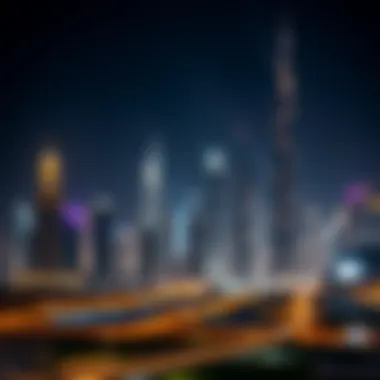
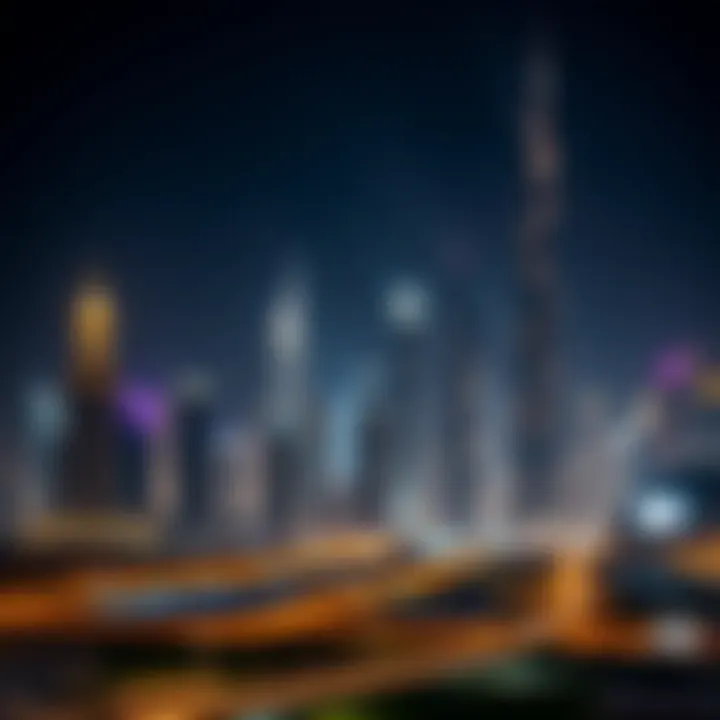
Intro
Ramadan holds a prized place in the heart of the UAE. As one of the most sacred months for Muslims, it is a time for reflection, prayer, and community. The year 2023 will mark significant practices and events surrounding this holy month, starting on the evening of March 22nd and concluding with Eid al-Fitr on April 21st. During this month, the usual rhythm of life sees a transformation, as individuals and families fast from dawn until sunset. It's not just about abstaining from food and drink; it's a holistic cleanse that involves the mind and spirit.
The cultural richness of Ramadan is palpable in the UAE. Mosques from Abu Dhabi to Dubai brim with worshippers, and the call to prayer becomes the soundtrack of the day. Special community events flourish, with iftar gatherings serving as opportunities for family and friends to come together. Beyond the spiritual, Ramadan also has its impacts on practical aspects like business and real estate. For instance, the hours of operation for businesses often shift, and there can be unique opportunities in the property market during this time. Investors and homeowners alike need to pay attention to these trends.
This article aims to provide an in-depth exploration of Ramadan 2023, detailing its religious importance, the array of traditions that make the month unique, and the influences it exerts on various sectors, particularly real estate. Here, readers will find insights tailored specifically for investors, agents, and expats hoping to navigate the changing landscape during this momentous period.
As we delve deeper, we will examine:
- The current state of the property market during Ramadan,
- Areas that show promise for investment,
- The multifaceted effects of Ramadan on community life, and
- How stakeholders can align their strategies to harness the potential this season offers.
Understanding Ramadan
Ramadan is more than just a month of fasting; it's a period that encapsulates a rich tapestry of history, faith, and cultural practices. This section aims to unveil the multifaceted importance of Ramadan, shedding light on its historical roots, the religious obligations it entails, and how its observance is determined each year. For anyone seeking to grasp the essence of Ramadan 2023 in the UAE, understanding these elements is essential.
The Historical Context of Ramadan
To comprehend Ramadan fully, one must look back at its historical context. It traces its origins to the time of the Prophet Muhammad. Around 610 CE, Muhammad received the first revelations of the Quran during the month of Ramadan, marking this period as sacred in Islamic tradition. This connection to the Quran deeply embeds Ramadan into the Islamic faith, making it a time of introspection and spirituality. Over centuries, the practices surrounding Ramadan have evolved, yet the core principles remain grounded in its historical significance.
Ramadan is marked not just by fasting, but also by spiritual reflection, increased devotion, and worship. During this month, Muslims are encouraged to engage with their beliefs more profoundly, reflecting on their own lives and the greater community. Such historical background sets the stage for its profound impact on individual lives and society at large.
Religious Significance in Islam
Ramadan holds immense religious significance in Islam. It is one of the Five Pillars, which are the fundamental acts of worship and practice for Muslims. Fasting during Ramadan, known as Sawm, is obligatory for all adult Muslims. This fast lasts from dawn until sunset, a practice intended to promote self-discipline, empathy for the less fortunate, and spiritual growth.
During this month, the Quran is recited more frequently, and Muslims are encouraged to seek forgiveness and show compassion. The spiritual benefits are not simply about abstaining from food and drink; it’s about purifying the soul and maintaining continuous prayer. The end of Ramadan is celebrated with Eid al-Fitr, a festival expressing gratitude and joy, culminating in communal prayers and feasting.
Muslims who are unable to fast due to health concerns, pregnancy, or other valid reasons must provide compensation through charitable acts, ensuring that this month remains inclusive and supportive of the community in its entirety.
How Ramadan is Determined
The timing of Ramadan varies each year, as it is based on the lunar calendar. The month begins with the sighting of the new moon, often creating a blend of anticipation and excitement within the community. Traditionally, local mosques or Islamic authorities announce the start of Ramadan, using methods such as direct moon sighting or astronomical calculations.
This determination process can vary by region, reflecting local traditions or interpretations. In many instances, you may find that neighboring regions or countries may start Ramadan on different days based on their moon sighting practices. This can lead to fascinating discussions among families and communities during preparatory days, where some may observe a day of fasting earlier or later than others.
Understanding the historical, religious, and determining aspects of Ramadan provides valuable insights not only for Muslims but also for non-Muslims residing in the UAE. It touches on the deep connections between faith, culture, and community, making it vital for anyone looking to engage meaningfully during this sacred time.
Ramadan Start Date in the UAE
The start date of Ramadan holds great significance in the UAE, marking the commencement of a month filled with spiritual reflection and community bonding. It's more than just a calendar event; it influences daily routines, professional environments, and social interactions across the emirates. Each year, the anticipation surrounding the date builds, as it represents a chance for renewal and discipline for many.
Expected Start Date
For 2023, it's expected that Ramadan in the UAE will begin around the 23rd of March, depending on the sighting of the moon. Due to the lunar calendar, the exact date can fluctuate, adding an element of excitement and uncertainty to the period leading up to it. Residents typically watch for official announcements from the UAE’s Moon Sighting Committee. This event captures the community's collective attention, as families gather to observe the sky in hopes of sighting the crescent, symbolizing the start of this sacred month.
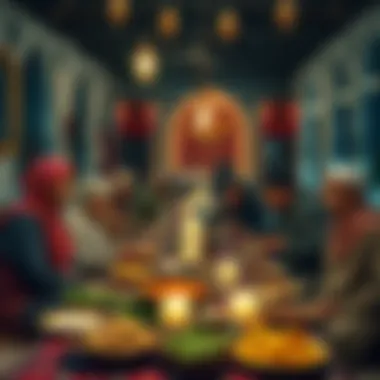
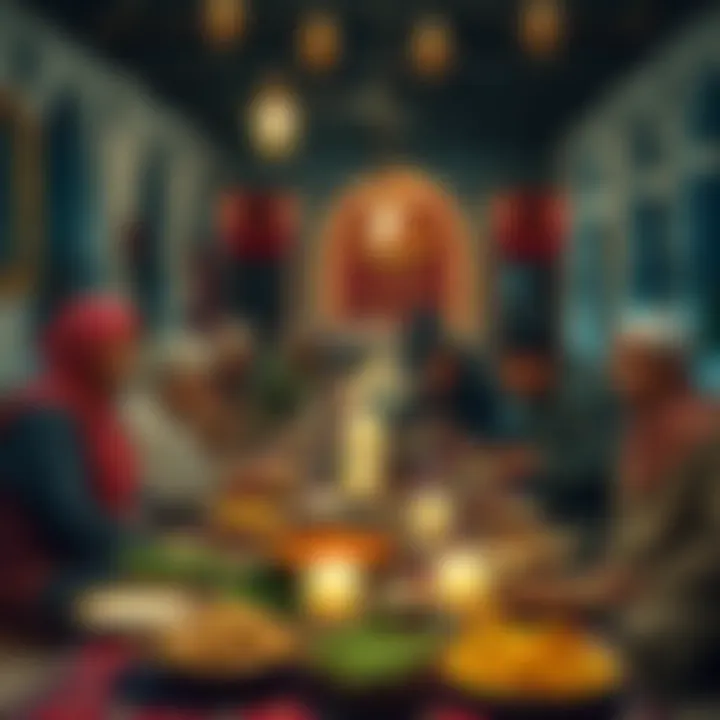
Methods of Moon Sighting
In the UAE, the traditional method of determining the start of Ramadan relies largely on the moon sighting. Observers often head to designated areas for clear visibility, using either the naked eye or telescopes. This practice isn’t just an ancient tradition; it’s a reflection of faith and commitment, as many believe sighting the moon is an act of worship in itself.
"The community's eagerness to witness the crescent moon for Ramadan shows how deeply woven this event is into the fabric of UAE culture."
Additionally, technological advancements have made a marked impact on this process. Many now rely on astronomical calculations to predict the moon phases though there remains a strong preference for the traditional sighting method. Local news broadcasts and online platforms are buzzing with updates as Ramadan approaches, keeping residents informed and connected.
Both the expected start date and the methods used to determine it highlight how crucial this period is – not only spiritually but also socially. For expatriates and locals alike, understanding these practices can bridge cultural gaps, enabling greater participation and respect during this significant month.
Cultural Traditions and Practices
Cultural traditions and practices during Ramadan in the UAE have immense significance, not only in the spiritual realm but also in enhancing community spirit and strengthening bonds among families. The essence of these traditions is interwoven with the profound religious observances of the month, creating a rich tapestry of customs that reflect the society’s values and social fabric. For both locals and expatriates, participating in these practices can foster deeper understanding and mutual respect, making Ramadan a time of unity and observation for all.
Fasting: Rules and Exceptions
Fasting during Ramadan is a monumental act of worship and self-discipline for Muslims worldwide, and those in the UAE adhere to specific rules that guide this sacred practice. From dawn until sunset, adults abstain from food, drink, and other physical needs. However, there are exceptions: individuals who are ill, elderly, pregnant, breastfeeding, traveling, or experiencing menstruation are exempt from the fast.
The act of fasting serves multiple purposes—it is not merely about abstaining from food but a means to cultivate self-control, empathy for the less fortunate, and heightened spiritual awareness. The UAE has distinct customs surrounding fasting, like the practice of Ihtikaf, where some individuals choose to seclude themselves in mosques for intensive worship. This is a deeper commitment that showcases the sanctity of Ramadan within the local culture.
Iftar and Suhoor: Meal Details
The meals that break the fast, Iftar and Suhoor, are among the most cherished culinary traditions of Ramadan in the UAE. Suhoor is the pre-dawn meal consumed before the fast begins, and it generally comprises hearty foods designed to sustain energy throughout the day. Common dishes include oatmeal porridge, dates, and a variety of breads, ensuring participants start the day with a balanced intake.
As the sun sets, the lively atmosphere surrounding Iftar brings families and communities together. Traditionally, the fast is broken with dates and water, followed by a feast featuring biryani, grilled meats, and an array of sweets like kunafa and qatayef. It is common for families to invite neighbors to share in the meal, reflecting the generosity and camaraderie that Ramadan fosters. Iftar meals have become elaborate events in hotels and restaurants, showcasing a fusion of traditional Emirati dishes with international cuisines, making them a significant draw for residents and tourists alike.
Community and Family Involvement
Community engagement and family involvement are central themes during Ramadan, with social gatherings amplifying the feeling of togetherness. Mosques become hubs for communal prayers and reflections, and many UAE residents engage in charitable activities, emphasizing the need to help those in need. Every night, local mosques host Iftar meals for the community, providing both food and an opportunity for social interaction. This fosters inclusivity and solidarity, particularly among expatriate communities who may feel distant from their own cultural roots during this significant time.
Families often gather for evening prayers, known as Taraweeh, bringing together individuals of all ages. Many parents use this time to teach their children about the values of compassion and gratitude, encouraging them to appreciate the blessings they have. For expats, participating in local customs can serve as a bridge to understanding the cultural nuances of their host country, while also embracing the deep values shared across different cultures.
Ramadan serves as a reminder that despite personal hardships, fostering community ties and traditions can elevate the experience of life, enhancing both individual and collective well-being.
The traditions surrounding Ramadan in the UAE are multifaceted, combining deep-rooted religious observances with a vibrant communal spirit. This month serves as a reminder of the collective human experience, drawing people together through shared practices and a common goal of spiritual growth.
Economic and Social Impact of Ramadan
Ramadan has a significant bearing on various layers of life, particularly in the UAE. The month is not just about pious reflection; it shapes economic patterns and social interactions in profound ways. Understanding its impact is crucial for investors, business owners, and expats alike, as this shared experience influences market dynamics and community ties significantly.
Business Operations During Ramadan
Operating a business during Ramadan demands more than just adjusting store hours. Many businesses adapt their schedules, often opening later and closing earlier to accommodate fasting hours. This flexibility is vital for maximizing foot traffic during iftar, when people break their fast, and they might be in a shopping mindset. Retailers, for example, often utilize promotions to entice customers who are breaking their fast or shopping for gifts.
- Adjusting Work Hours: Many firms shift their working hours, leading to shorter workdays. Employees might work from 10 AM to 3 PM instead of traditional hours. This can lead to challenges around productivity, but also opens windows for deeper customer engagement during the evenings.
- Unique Marketing Initiatives: Businesses actively promote iftar meals or special discounts during Ramadan. Restaurants create special menus to attract families breaking their fast together. This is particularly true in areas like Dubai and Abu Dhabi where high foot traffic exists.
- Financial Strategies: Some sectors might see either a boom or a downturn. For instance, the food and hospitality industry often thrives as people go out after sundown, while sectors like fitness might face slumps as many people refrain from rigorous activities.


Changes in Consumer Behavior
During Ramadan, consumer behavior shifts noticeably. The act of fasting encourages a sense of community, leading to families gathering for iftar or suhoor. This shared aspect impacts spending habits and preferences.
- Increased Food Purchases: There can be a marked increase in grocery shopping, as families prepare meals for iftar. Foods that are staples in iftar gatherings—like dates, juices, and various dishes—experience huge spikes in demand.
- Cultural Dining: Restaurants often witness packed spots during iftar. Dining out becomes a social event, drawing families and friends together.
- Gift Exchanging Habits: It’s also common for people to buy gifts for friends and family during this time, whether it’s traditional sweets or more modern gifts, which contributes to increased spending.
Impact on the Real Estate Market
Ramadan also casts its influence over the real estate sector, an aspect often overlooked. The month fosters community developments and may lead to changes in demand.
- Short-Term Rentals: With many expatriates and locals traveling for the holiday or hosting family, there can be a surge in demand for short-term rental properties. This affects market pricing and rental availability.
- Community Spaces: Increased gatherings both during Ramadan and Eid means that areas with parks and communal spaces typically see higher desirability. Investors often seek such areas to capitalize on the family-oriented social framework established during Ramadan.
- Events Driving Engagement: Many developers host events, creating a buzz around their projects during Ramadan. These community-driven events can lead to increased interest in nearby properties.
In the UAE, Ramadan isn’t just a month of fasting but a transformative period that can reshape economic landscapes and community interactions.
Thus, each Ramadan brings with it a distinct set of economic variables that stakeholders should consider. As businesses, consumers, and investors adapt to the waves of change that Ramadan inspires, remaining cognizant of the nuances is key for success in this vibrant market.
Ramadan Activities and Events in the UAE
Ramadan in the UAE is a time not just of spiritual reflection but also a season rich in cultural activities and community events. These gatherings serve to strengthen the communal bonds and create an atmosphere of togetherness among families, friends, and neighbors. The significance of these activities cannot be overstated, as they embody the essence of compassion and social responsibility which lies at the heart of Ramadan. For investors, expatriates, and locals alike, understanding these events is crucial for integrating into the fabric of Emirati society during this important month.
Cultural Events and Festivals
Within the UAE, Ramadan is celebrated vibrantly through various cultural festivals and events that engage diverse communities. Cities like Dubai and Abu Dhabi come alive with an array of activities.
- Ramadan Night Markets: Many cities host night markets during Ramadan, featuring local crafts, delicacies, and entertainment. These markets often transform into buzzing hubs where families gather to enjoy music, cultural performances, and delicious food, fostering a sense of community.
- Art Exhibitions: Art plays a significant role in expressing cultural narratives. Local galleries may exhibit works related to Ramadan themes, showcasing the beauty and creativity of Emirati heritage.
- Storytelling Events: In various community centers, storytelling sessions focused on traditional tales and Islamic teachings can be found. They serve to educate attendees, especially children, about the significance of Ramadan while also entertaining them with captivating stories.
- Iftar Gatherings and Festivals: These events are also about breaking bread together. Numerous resorts and hotels offer lavish Iftar buffets, celebrating culinary traditions from around the world. Sharing a meal at sunset is a cherished practice during Ramadan, and these gatherings emphasize unity and hospitality.
Ramadan activities like these benefit not just locals but also expatriates and tourists. They provide a unique glimpse into the culture and values of the region while presenting countless networking opportunities for businesses and investors.
Volunteer Opportunities
With the essence of giving at the forefront of Ramadan, numerous volunteer opportunities emerge throughout the UAE. These initiatives not only reach out to those in need but also foster community spirit:
- Food Drives: Many organizations coordinate food collections to prepare Iftar meals for the underprivileged. Volunteers can take part in packaging food or distributing meals, creating a sense of fulfillment.
- Community Service Projects: Engaging in community service during Ramadan allows individuals to bond over shared goals. Opportunities can range from assisting the elderly to participating in clean-up campaigns, each step taken reflects the spirit of cooperation.
- Refugee Support Initiatives: Several charities focus on supporting refugees, providing food, clothing, and bedding. Volunteers can help collect items or aid in organizing donation drives.
Participating in such activities not only adds purpose to the Ramadan experience but also creates lasting memories and connections. Those new to the UAE or expatriates looking for a doorway to immerse themselves in the local culture find that volunteering helps to build a sense of belonging and community.
Tips for Expatriates During Ramadan
As the holy month of Ramadan approaches, it becomes essential for expatriates living in the UAE to understand and respect the unique cultural landscape they'll navigate during this time. Ramadan is not just a religious observance; it's a significant cultural phenomenon that blends spirituality, community, and customs prevalent in the UAE. Understanding how to approach this period can lead to not only a smoother time but also a richer cultural experience.
Navigating Cultural Sensitivities
For expatriates, the essence of Ramadan lies in its profound cultural implications. There are several cultural sensitivities to be aware of:
- Fasting Hours: First and foremost, it is crucial to recognize that from dawn until sunset, Muslims fast from food and drink. For expats, this means being mindful of eating or drinking in public during these hours. Though some establishments may remain open, it’s respectful to avoid open displays of consumption.
- Public Behavior: The general atmosphere during Ramadan leans towards tranquility. Engaging in loud activities or offensive behavior can be frowned upon. Keep your voice down and maintain a demeanor that reflects the reverence of this significant period.
- Dress Code: While the UAE is more liberal than some nations, Ramadan calls for modest attire. Casual wear should still respect local customs. Natural fibers in subdued colors can help honor the sacredness of the month.
- Workplace Considerations: Many companies reduce working hours during Ramadan. Understanding your workplace’s guidelines can help you adapt without disrupting your productivity. If in doubt, ask about adjustments in schedules or workload.
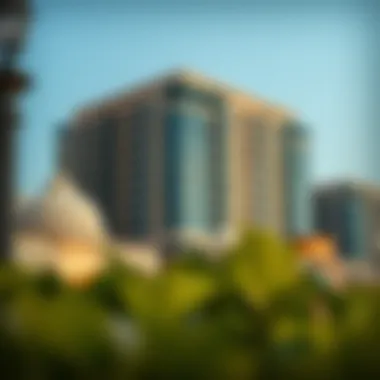
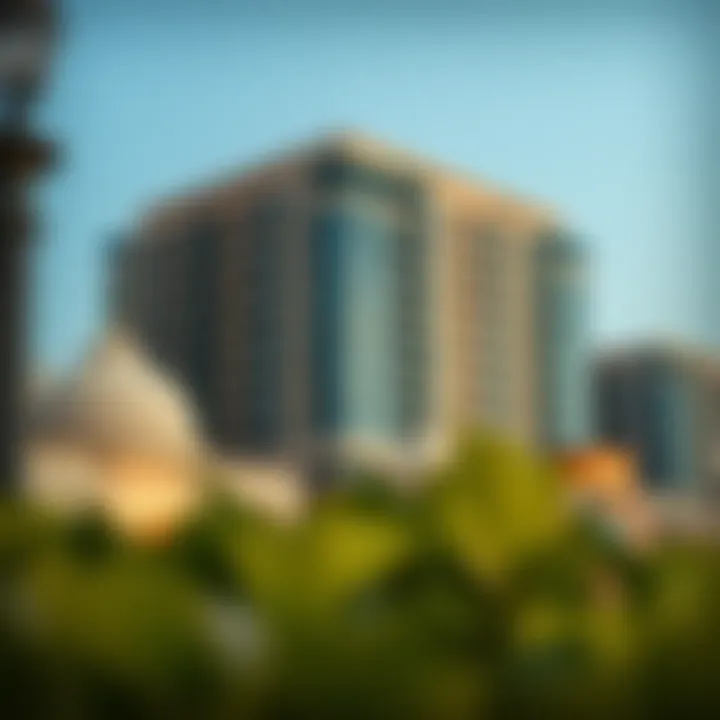
Understanding Local Customs
Understanding local customs can enhance your experience during Ramadan. Here are a few practices to keep in mind:
- Iftar: The breaking of the fast occurs at sunset, traditionally with dates and water. If invited to an Iftar meal, it's a gesture of hospitality. Always express your gratitude for the invitation. Bringing a small gift like sweets can also be a thoughtful gesture.
- Suhoor: This pre-dawn meal is important, especially for those who are fasting. Many expatriates participate in this practice, often spending time with family or friends. It’s a prime opportunity to deepen bonds with your local colleagues.
- Charity and Giving: During Ramadan, the act of giving and supporting less fortunate individuals becomes heightened. Engaging in charitable deeds during this month is encouraged. You might consider donating food items or participating in community events aimed at helping others.
- Learning About Traditions: Each emirate holds its own unique customs during Ramadan. For instance, in Dubai, night markets spring to life during the month, offering food and entertainment. Attend local events where you can observe and partake in these rich traditions.
"Respect for local customs is the bedrock for a harmonious life in the UAE, especially during Ramadan."
Adapting to life during Ramadan as an expatriate in the UAE fosters not just tolerance but appreciation for cultural diversity. It’s an opportunity for mutual understanding, building relationships and creating memories that enrich your time in the Emirates.
Consequences of Ramadan on Daily Life
The month of Ramadan brings a variety of changes that hold meaningful consequences for daily life in the UAE. For residents and visitors alike, understanding these changes both provides insights into the local culture and helps facilitate a smoother experience during this holy month. Ramadan is not merely a religious observance; it alters the rhythm of life across various sectors including business, social interactions, and even personal behavior.
Adjustments to Work Schedules
During Ramadan, there is a noticeable shift in the work schedules across the UAE. Many businesses make adjustments to accommodate fasting individuals. The workday is typically shortened, often starting later in the morning, to allow employees time to partake in Suhoor, the pre-dawn meal. Depending on the organization, work hours may range from five to six hours. This is not just a benefit to the employees, but also respects the cultural practices of the community where the working population is heavily involved in fasting.
For example, in governmental entities, you might find work limited to 9:00 AM to 2:00 PM. This break from the usual longer days offers employees the chance to manage fasting while maintaining productivity. However, with these alterations, it’s essential for businesses to communicate effectively what the new schedules are, minimizing confusion for clients and partners.
Moreover, in industries such as retail and hospitality, changes in operating hours are also common. Many shops extend their hours into the night, catering to the influx of consumers seeking Iftar meals after sunset. Employees in these sectors might see significant changes in their shifts, with longer hours permitted after the sun goes down.
Local Regulations and Guidelines
Being mindful of local customs and regulations during Ramadan is crucial for maintaining respect and harmony in the community. Businesses and individuals alike need to be aware of the local laws that govern behavior during this month. The UAE government typically issues specific guidelines. This may include laws against eating, drinking, or smoking in public during fasting hours, which are strictly enforced. Observing such guidelines not only fosters a spirit of respect but also builds stronger bonds within a diverse community.
Additionally, restaurants may modify their operations to comply with local customs. Some establishments may opt to remain closed during the day, operating only after sunset, while others might create private dining areas for non-fasting patrons.
Social events and celebrations are also influenced by Ramadan. For instance, live events, concerts, or public gatherings might be limited or postponed, particularly during the first and last days of the month. Organizations may also organize community events aimed at charity and social outreach, providing opportunities for the community to come together and support those in need.
Ultimately, the consequences of Ramadan are multilayered, affecting not just religious practices but daily life in a myriad of ways. Understanding and adapting to these changes is essential for locals and expatriates alike into navigating this unique time, making respect for cultural practices paramount.
"Ramadan teaches us patience, humility, and community spirit, blending our daily routines into a richer cultural tapestry."
By remaining aware of these adjustments and guidelines, residents can ensure they are navigating Ramadan with cultural sensitivity and respect.
Culmination
As this article draws to a close, it's essential to take stock of Ramadan's multifaceted role within the UAE. Ramadan is not just a month of fasting; it's a significant period steeped in tradition, community, and deep cultural significance. It serves as a mirror reflecting the values of charity, empathy, and spiritual growth that are central to Islamic teachings. The importance of fostering stronger community bonds through various communal activities, especially in diverse places like the UAE, cannot be understated.
Reflections on Ramadan’s Role in Society
Ramadan profoundly influences societal dynamics, shaping daily life in tangible ways. Throughout the month, the rhythm of cities and communities shifts; food becomes a vessel for fostering relationships during Iftar gatherings. People from various backgrounds come together to share meals, breaking bread and building understanding among cultures.
Moreover, the month encourages reflection on personal conduct, prompting individuals to engage in acts of kindness and charity. Initiatives spring up, inviting everyone to contribute, whether through donations or volunteering to help those in need. This collective spirit helps strengthen the social fabric of the UAE.
In terms of business, while some sectors may slow down under the observance of fasting, others flourish. Retailers see changes in consumer behavior that require quick adaptation to cater to the Ramadan market. Promotional strategies focus on convenience, with late-night shopping hours and tailored products specifically for the month.
Ramadan also poses challenges, particularly for expatriates and new residents unfamiliar with local customs and traditions. However, this learning experience is an opportunity for growth and integration. Understanding and embracing the nuances of Ramadan can enhance social and professional relationships.
As we look toward Ramadan 2023, it is pivotal to acknowledge not only its significance in the lives of Muslims but also its wider impact on UAE society as a whole. Ramadan binds together diverse communities under a shared ethos of respect, understanding, and togetherness, making it a vital element in the ongoing narrative of the UAE's cultural landscape.
"Ramadan is not just about abstaining from food; it is about cultivating a deeper understanding of self and one's community."













